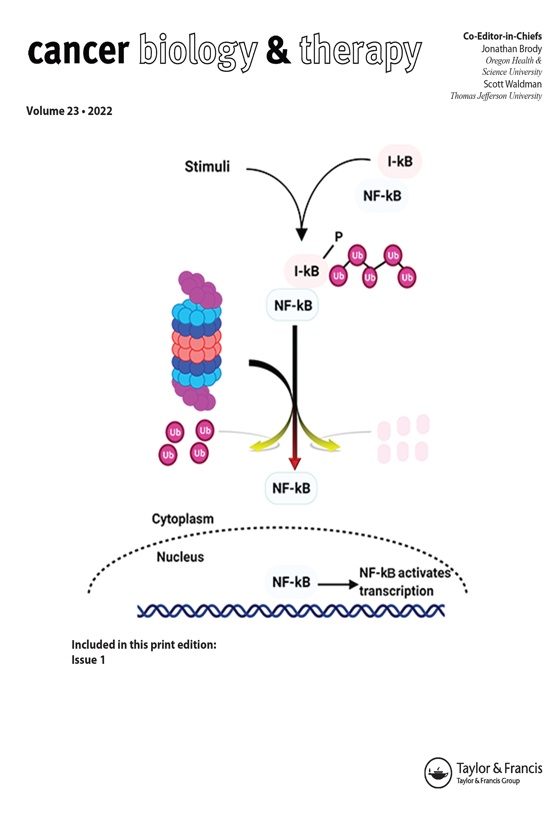Submit a Manuscript to the Journal
Cancer Biology & Therapy
For an Article Collection on
Targeting the Tumor Microenvironment for Cancer Immunotherapy
Manuscript deadline


Article collection guest advisor(s)
Dr. Xin Lu,
University of Notre Dame
xlu@nd.edu
Targeting the Tumor Microenvironment for Cancer Immunotherapy
The tumor microenvironment (TME) is a complex and dynamic milieu that plays a pivotal role in cancer development, progression, and response to therapy. It comprises not only cancer cells but also a variety of stromal components, including immune cells, fibroblasts, endothelial cells, extracellular matrix proteins, and signaling molecules. These components interact intricately, influencing tumor behavior and the host's immune response. Recent advances in cancer immunotherapy have underscored the importance of the TME in modulating immune cell function and therapeutic efficacy. By targeting the TME, significant efforts are ongoing to disrupt the supportive network that tumors exploit, thereby enhancing the effectiveness of immunotherapies and leading to improved clinical outcomes for patients with cancer.
Targeting the tumor microenvironment is crucial because it directly impacts the success of cancer immunotherapies. The TME often exhibits immunosuppressive characteristics that enable tumors to evade immune surveillance and resist therapeutic interventions. Factors such as inhibitory cytokines, regulatory T cells, and myeloid-derived suppressor cells within the TME can diminish the activity of effector immune cells. By understanding and manipulating these elements, we can overcome immune resistance mechanisms, promote anti-tumor immunity, and prevent tumor recurrence. Additionally, strategies that target the TME may enhance the delivery and efficacy of existing treatments, reduce side effects, and offer new avenues for combination therapies. This approach holds the promise of transforming cancer care by making immunotherapies more universally effective across different tumor types.
This Article Collection seeks contributions that explore innovative strategies for targeting the tumor microenvironment to enhance cancer immunotherapy. We invite original research articles and reviews that delve into various subtopics, including:
- Mechanisms of Immune Evasion in the TME: Studies on how tumors manipulate the microenvironment to suppress immune responses.
- Modulation of Stromal Components: Research on targeting cancer-associated fibroblasts, extracellular matrix, and angiogenesis within the TME.
- Immune Cell Reprogramming: Approaches to alter the function of immune cells in the TME to boost anti-tumor activity.
- Biomarkers and Predictive Indicators: Identification of TME-derived biomarkers for predicting patient response to immunotherapies.
- Combination Therapies: Clinical and preclinical studies on therapies that simultaneously target tumor cells and the TME.
- Emerging Immunotherapies: Development of novel immunotherapies at early or advanced stages.
- Bioengineering and artificial intelligence (AI) in the context of tumor immunology and immunotherapy.
***
Guest Advisor Dr. Xin Lu's laboratory at University of Notre Dame is focused on identifying cancer cell intrinsic and extrinsic mechanisms of tumor immune evasion, particularly in advanced genitourinary malignancies (prostate, kidney, penile), breast cancer and pancreatic cancer. His recent publications firmly establish that immunosuppressive myeloid cells, especially those of the neutrophil lineage, play the predominant role in inducing the exhaustion of cytotoxic T lymphocytes in many solid tumors. His research results also reveal a number of targetable mechanisms on how the oncogenic signaling in neoplastic cells exerts the cell non-autonomous functions to control the cancer-immune interactome in solid tumors. His laboratory is interested in developing chemical or biologic agents and dietary interventions as emerging cancer therapies.
***
All manuscripts submitted to this Article Collection will undergo a full peer-review; the Guest Advisor for this Collection will not be handling manuscripts.
Please review the journal scope and author submission instructions prior to submitting a manuscript.
The deadline for submitting manuscripts is October 3, 2025.
Please contact Cassie Houtz at cassie.houtz@taylorandfrancis.com with any questions or information about APC discounts.
Please be sure to select the appropriate Article Collection from the drop-down menu in the submission system.
Benefits of publishing open access within Taylor & Francis
Global marketing and publicity, ensuring your research reaches the people you want it to.
Article Collections bring together the latest research on hot topics from influential researchers across the globe.
Rigorous peer review for every open access article.
Rapid online publication allowing you to share your work quickly.
Submission Instructions
All manuscripts submitted to this Article Collection will undergo desk assessment and peer-review as part of our standard editorial process. Guest Advisors for this collection will not be involved in peer-reviewing manuscripts unless they are an existing member of the Editorial Board. Please review the journal Aims and Scope and author submission instructions prior to submitting a manuscript.
